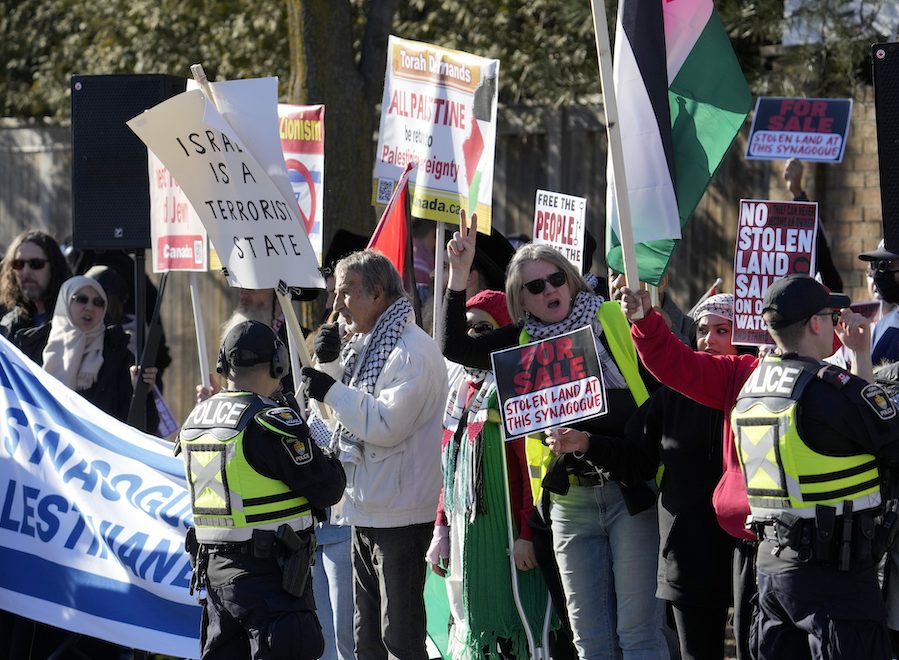Amid heightened tensions between pro-Palestine and pro-Israel activists, the City of Vaughan, just north of Toronto, recently voted to limit protests around community institutions, including houses of worship.
According to the bylaw, passed on June 25, nobody can organize or participate in a “nuisance” demonstration within 100 metres of any “vulnerable social infrastructure,” including schools, community centres and religious institutions. Here, a “nuisance demonstration” is defined as a demonstration that is “likely, on an objective standard, to cause a reasonable person to be intimidated.”
You may unsubscribe from any of our newsletters at any time.
The threshold for reasonable intimidation is not specified in the bylaw, though it explicitly states that protests do not need to include hate speech or incitements of violence to be understood as intimidating.
The bylaw passed following recent protests at local faith institutions, including a March protest at a Thornhill synagogue. The synagogue was hosting a real estate event to answer questions about purchasing land at various locations, including communities in the West Bank. Israeli settlements in the West Bank are considered a violation of international law by Canada and by the United Nations.
While some representatives of faith groups are celebrating the passing of this kind of “bubble zone” legislation as a necessary step to protect people of faith from hate, others see it as an overreach or a possible source of anxiety for their community members.
For his part, Richard Marceau, the vice-president of external affairs and general counsel for the Centre for Israel and Jewish Affairs, sees it as necessary.
“There’s a crisis of antisemitism in Canada. The numbers — and you can find them from Toronto, Montreal, and Vancouver and Ottawa — are through the roof in Toronto since Oct. 7,” he told Broadview in an interview.
Speaking at a June 18 press conference for the Canadian Interfaith Conversation, a coalition of faith groups, Marceau noted that Canadian Jews aren’t alone in facing hate.
“It’s not only a Jewish community problem…Institutions from other faiths have also been targeted and they deserve as much protection,” he said.
More on Broadview:
- United Church moderator, other church leaders march on Parliament Hill to call for Gaza ceasefire
- New survey shows Trudeau struggling to retain support from faith groups
- Canada isn’t as accessible as it claims to be
During the press conference, Shaila Carter, co-chair of the Canadian Interfaith Conversation and interfaith specialist at the Islamic Relief Fund, echoed Marceau’s support for bubble zone legislation, citing recent instances of hate directed at Canada’s Muslim community.
Reflecting on it further in an interview, Carter tempered her support for the legislation with concerns about how the increased police presence necessary to protect a bubble zone might be discomforting to the Black Muslims in her community.
Others worry that this type of legislation would place outsized limitations on freedom of assembly and expression.
Richard Moon, a law professor from the University of Windsor whose research focuses on religious freedom and freedom of expression, acknowledged the importance of safety in and around religious institutions but also cautioned against curtailing Canadians’ charter right to protest.
Acknowledging the many recent acts of violence around religious institutions and the importance of protecting congregants, Moon also noted that some recent protests around religious institutions were “in response to very particular meetings or gatherings that weren’t necessarily religious in character” — citing the aforementioned real estate meeting, or a recent tour in support of the Israel Defense Forces (IDF).
“It’s hardly surprising that there may be people who want to protest that kind of meeting,” Moon said. “It strikes me [that] they should have a right to protest that — [but] not to the extent where they can physically interfere. And so again, maybe it’s legitimate to have some kind of zone, but not to create a zone that completely insulates the meeting place from any exposure to protest.”
Some Jewish institutions in Montreal have their own bubble zones, similar to those that now exist around all community institutions in Vaughan. These bubble zones came into effect in March of this year, following protests outside Montreal’s Spanish and Portuguese Synagogue and outside Federation CJA, a Jewish community organization.
The synagogue protest was held in response to an event inside the synagogue, which CBC News confirmed showcased a real estate agency that has West Bank listings on its website.
At Federation CJA, protesters assembled outside the building, protesting a speaking tour of three IDF reservists. A promotional Instagram post promised “stories from Israeli advocates as they travel to Canada to participate in the fight against the delegitimization of Israel.”
Marceau said the Federation CJA protest prevented some event attendees from entering the building, while others were trapped inside for hours.
Bubble zones are not the only safety and security tool that religious communities can access. Funding programs, such as Ontario’s Anti-hate Security and Prevention Grant and Canada’s Security Infrastructure Program, provide religious institutions with funding for additional security measures — provided they have the time, knowledge and documents to apply for the grant.
But not every religious group wants governments to do more.
Many United churches affirm 2SLGBTQ+ rights and inclusion, making them frequent targets of homophobic vandalism and harassment. Yet, Kendra Mitchell-Foster, regional minister for justice for The United Church of Canada’s Pacific Mountain Region, questions whether more policy, policing and legislation offer the best path forward.
“For me, the idea of safety and security is much more rooted in community care than it is in legislation or in policy,” said Mitchell-Foster.
As tensions rise, faith leaders and experts alike seem to agree that the safety of Canadians is an important concern. The best path towards safety, however, is less easy to agree upon.
***
Amarah Hasham-Steele is a Broadview summer intern, based in Toronto.













